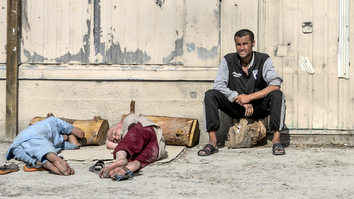KABUL -- Her friends and family have told her to pack up and flee Afghanistan so she would not risk a potential Taliban takeover, but sitting on a terrace, smoking a cigarette, Laila Haidari is determined to stay.
The founder of a rehabilitation centre for drug addicts, Haidari says many of her social activist friends have already left the country.
"How can I easily leave all this behind? 'Laila Haidari -- mother of the addicts' -- is my identity," she told AFP.
The United States has pulled out more than 90% of its troops from Afghanistan as peace talks between the Taliban and the Afghan government have stalled and as the insurgents are waging an offensive.
![In this picture taken in Kabul on June 19, Laila Haidari, the founder of a rehabilitation centre for drug addicts, poses for a picture at her café, where she employs recovered addicts, in Kabul. [Adek Berry/AFP]](/cnmi_st/images/2021/07/13/30628-000_9dl8ac-585_329.jpg)
In this picture taken in Kabul on June 19, Laila Haidari, the founder of a rehabilitation centre for drug addicts, poses for a picture at her café, where she employs recovered addicts, in Kabul. [Adek Berry/AFP]
![Drug addicts cover themselves with blankets along the river plains of the Kabul River on June 25. [Adek Berry/AFP]](/cnmi_st/images/2021/07/13/30629-000_9d48r6-585_329.jpg)
Drug addicts cover themselves with blankets along the river plains of the Kabul River on June 25. [Adek Berry/AFP]
"For the Taliban, drug addicts are criminals who are tried and sent to prison; they do not see them as sick," Haidari said.
Exporting heroin has provided the Taliban with billions of dollars, fuelling their insurgency.
With poppies cheap and easy to grow in Afghanistan, the country now provides 90% of the world's heroin production.
The production of crystal methamphetamine, created from the ephedra plant, which grows wild in the country, has also surged.
According to anti-narcotics analysts, 11% of Afghanistan's 34 million population use drugs, and 4% to 6% are addicted to hard stimulants.
'The Mother Centre'
Raised in Iran, where her family had taken refuge, Haidari was married at 12 to a mullah, who as a man had instant custody rights over their three children when she divorced him a decade later.
Upon her return to Afghanistan, she discovered that her brother, Hakim, had become addicted to heroin and was living with other homeless addicts under a squalid Kabul bridge, next to a filthy stream.
Like "something out of a Hollywood movie", she began rescuing the "living dead" and attempting to wean them off drugs using the Narcotics Anonymous programme, at a live-in centre that she launched.
"When I started, it was estimated that there were around 5,000 addicts in the country. The youngest were 15 to 18 years old," she said.
"Today the number is only increasing ... 10- to 12-year-old children are falling victim," she said.
Her first guests affectionately named her live-in centre "the Mother Centre".
Haidari has helped hundreds kick their habit and connected them with support groups for ongoing help.
Sayed Hossein, 33, was one of the addicts Haidari pulled out from under the bridge and gave a fresh start.
"I started using drugs when I was in Iran; I arrived here at 20 without a family," said Hossein, who called Haidari "my mother".
He now works at the Taj Begum café -- temporarily shut because of the pandemic -- that Haidari established to offer employment to recovered addicts.
Taliban threat
Wearing a yellow dress with turquoise painted nails, Haidari watches over the Taj Begum -- increasingly popular with young Hazaras, a minority persecuted under the Taliban and now facing a fresh wave of violence in Kabul.
As a woman who enjoys speeding through the city's streets in her car, singing along to the radio with her friends, she knows there is much that puts her at risk.
A string of high profile women, including activists, judges and journalists, have been assassinated in recent months -- in attacks that the US and Afghan governments have blamed on the Taliban.
"Can the Taliban accept me, with an uncovered head, smoking and chatting with a man?"
"I received a lot of threats in the past ... now the only threat is the Taliban," she said.
As violence surges across the country, Haidari has already overcome so many challenges in her lifetime.
"The Taliban killed people 20 years ago. Today they are attacking the districts. When they get here, we will have to fight," she said.








It means that the gift from the mean and wicked country of Iran to us was that thousands and tens of thousands of our youth were made addicted to drugs, and thousands of our other compatriots were sent to the war in Iraq and Syria in the ranks of Fatemiyoun's misled groupو where they got victim of Iran's interests. These were the gifts of an Islamic neighbor country to Afghanistan. The gifts of the other Islamic neighbor -- Pakistan to Afghanistan have been training militants for the last four and half decades and making them fight against the central Afghan governments under the name of Islam. May Allah bless our people and our country.
Reply1 Comment